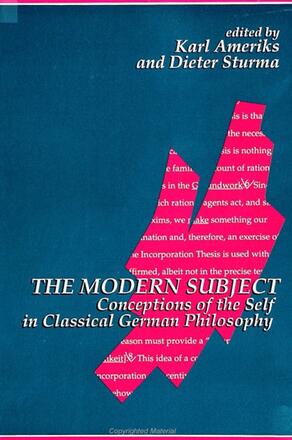
The Modern Subject
Conceptions of the Self in Classical German Philosophy
Alternative formats available from:
Provides a thorough background study of the postmodern assault on the standpoint of the subject as a foundation for philosophy, and assesses what remains today of the philosophy of subjectivity.
Description
Contemporary thought often claims the "death of the subject," and postmodernists typically contend that the standpoint of human subjectivity has been surpassed as a foundation for philosophy. A proper appreciation of these influential claims requires an understanding of the main tradition in which the standpoint of subjectivity was articulated, namely the classical philosophy of German Idealism. This book provides such an understanding.
The authors assess what is dead and what is alive today in the philosophy of subjectivity, and offer the most thorough study available on the background of the postmodern assault on the primacy of the subject. Tracing this assault back to reactions to Kant, they elucidate the historical and systematic details of the development of the concept of the self in Classical philosophy from Kant to Fichte and Hegel. Manfred Frank, one of Europe's most prominent and prolific writers on neo-structuralism, provides two major contributions--an account of the philosophical foundations of the reaction to Kant in early romanticism (especially Novalis), and a defense of the ineliminability of self-consciousness against its critics in current analytic philosophy. Essays by other contributors-including Henry Allison, Robert Pippin, Daniel Breazeale, Guenter Zoeller, Ludwig Siep, Veronique Zanetti, and Georg Mohr--relate the concept of the self to topics such as freedom, teleology, modernity, and intersubjectivity.
Karl Ameriks is Professor of Philosophy at the University of Notre Dame. Author of Kant's Theory of Mind, he is a past president of the North American Kant Society. Dieter Sturma teaches at Luneburg University in Germany, and is author of Kant uber Selbstbewusstsein.
Reviews
"I very much like the way in which this work bridges the so-called 'continental' and 'analytic' traditions within philosophy, while at the same time calling attention to figures that deserve more attention in both traditions. It represents an important contribution to the historiography of the early post-Kantian era. Furthermore, it is not just another antiquarian study of some figures that might be of limited interest to historians of philosophy. Rather, it adds an interesting voice to the discussion of 'subjectivity' within the German and Anglo-American contexts." -- Manfred Kuehn, Purdue University
"To a remarkably consistent degree and at a level of argumentation that is uncommonly clear and trenchant, the articles combine historical erudition with a rich awareness of traditional interpretations. The general effort of the text--to bring perspectives from a certain line of readings of subjectivity in German idealism (and romanticism) to bear on contemporary philosophy of mind in the analytic tradition--is a success and makes for a very good read." -- Daniel O. Dahlstrom, Catholic University of America